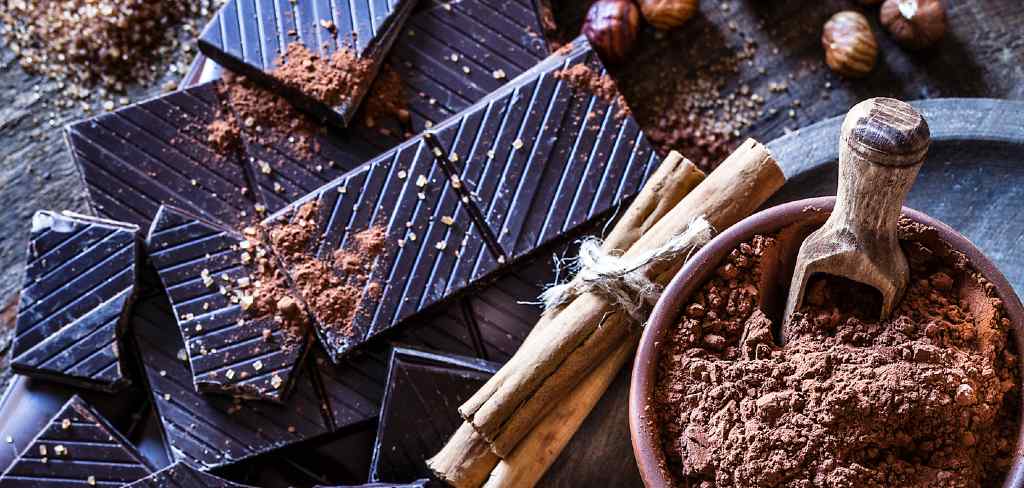
by Louis Caravella
The Divine Health Benefits of Cocoa
If you’ve ever said, “This chocolate is divine,” you are correct according to science! The cocoa plant’s scientific classification is Theobroma cacao: “food of the gods.” And for centuries, people have used cocoa as an ingredient in drinks and foods, including, of course, everybody’s favorite treat: chocolate.
The “beans” of the cocoa plant are actually seeds that contain an abundance of healthy nutrients. Unfortunately, the health benefits of cocoa are usually counteracted by how we consume it: in chocolate with high quantities of added sugar.
Milk chocolate can counteract the positive effects of cocoa as well and white chocolate doesn’t contain cocoa at all but, rather, cocoa butter. So, the goal is to eat healthy forms of cocoa, including certain types of dark chocolate, organic cocoa and cacao, which is raw cocoa.
Below, we’ll look at how cocoa can be beneficial to your health and how best to consume it to maximize the tasty superfood’s health benefits.
How Cocoa Is Healthy
Antioxidants
Cocoa is high in antioxidants, which can be useful in the prevention and treatment of cancer. Antioxidants combine with free radicals, preventing oxidation which damages cells and DNA, and can lead to the development of cancer.
Cancer Cell Inhibition
Polyphenols are antioxidant-rich nutrients in certain plant-based foods. Polyphenols help control abnormal and potentially cancerous cell growth by interfering with the production of enzymes that cause tumor growth and malignancy.
Blood Sugar and Blood Pressure
The polyphenols in cocoa have also been shown in studies to reduce blood pressure of hypertensive diabetics, while reducing fasting blood sugar. According to a study of overweight adults published in the International Journal of Cardiology (2011), “sugar-free but not sugared cocoa consumption led to a significant reduction of both systolic and diastolic BP in comparison with placebo.”
Depression and Anxiety
Cocoa interacts with neurotransmitters, including endorphins, which are believed to block the brain receptors that are responsible for feeling pain and depression. Like regular exercise, meditation, or even laughing, cocoa causes the release of endorphins.
How to Eat Cocoa
We don’t need to tell you how to eat chocolate, but eating cocoa for its health benefits is a bit different. Cocoa is the roasted version of raw cacao, which can be eaten as well. Pure, unsweetened cacao powder can be eaten without all the bitter taste when it’s mixed into foods like cereal, yogurt, and smoothies.
You can also eat cacao nibs. They are the seeds of the cocoa plant that are fermented with the white cocoa butter intact. The seeds are fermented in sealed containers for five to 10 days and then dried or roasted. In their unground form, nibs make a nutrient-filled snack on their own. They have a crunch and a buttery texture, while tasting like a coffee bean. And like cocoa powder, nibs are often mixed into other foods such as acai bowls.
If you don’t want to eat cacao/cocoa, look for dark chocolate that is 70 to 85% cacao solids and low in sugar or sugar-free. And whether you’re looking for chocolate or cooking with cacao or cocoa, consider sweetening the delicacy with stevia or other non sugar sweeteners.
Stevia is naturally gluten-free, non-GMO and has no glycemic impact. Stevia is also an excellent alternative to sugar for patients with diabetes, and may be helpful in regulating glucose levels.
Other natural sweeteners that health specialists suggest considering include raw honey, dates, coconut sugar, maple syrup, blackstrap molasses, balsamic glaze, banana puree, brown rice syrup and real fruit jam. Just bear in mind that these sweeteners can affect one’s blood sugar and caloric intake.
So, there are plenty of options for sweetening cocoa and eating it in combination with other healthy superfoods. Do some experimenting and find the cocoa recipe that’s right for you